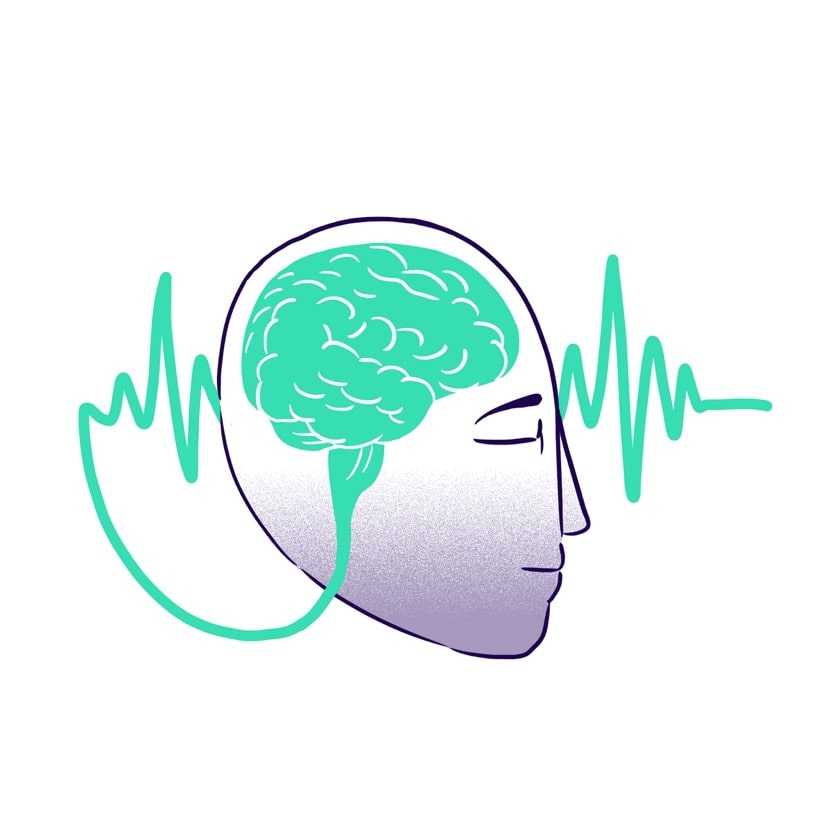First part: clinical interventions based on meditation
The image of a relaxed and smiling Buddha permeates the popular representations one may have of the contemplative traditions that place the practice of meditation at the heart of their fundamental activities. And in modern societies, happiness and relaxation are the two most coveted states on the path to well-being. It goes without saying that such a smiling and relaxed Buddha must really sleep well! It is therefore not surprising that clinical interventions based on meditation have been in the crosshairs of scientific research to evaluate their capabilities to treat sleep disorders.
Beyond these amusing premises, there are several important reasons that justify an interest in this research axis. Sleep disorders are very widespread within the population and often accompany or exacerbate psychological or physiological states such as anxiety, depression, cardiovascular problems, or even obesity. There is thus a strong necessity to find treatments that could improve the quality and duration of sleep, in order to help individuals cope with deleterious health states, or to prevent other health problems from appearing or developing.

Asking the right questions in the right contexts
While sleeping pills are widely consumed and are very effective for some people, we are all aware of the side effects they can have, especially when combined with other medications. On the other hand, psychotherapeutic treatments specifically developed for insomnia (such as "cognitive-behavioral therapy for insomnia," or "CBT-I") are expensive and still not very accessible. Meditation-based interventions could therefore represent an easy-to-approach, low-cost, and generally risk-free alternative in the fight against sleep disorders.
And this is where the inevitable question arises: "Does it work?". When I am asked, as a researcher working on the subject, to answer this question or another related to meditation, I often end up saying: "I can't answer you, you should try it for yourself!". And this is for two main reasons. First, and contrary to popular belief, science is not an oracle of truth. When examining the various studies conducted on a given subject, one is often confronted with a confusing scenario, characterized by mixed and contradictory results, as well as inconsistencies between measurements and differences between the populations examined. Such a degree of uncertainty is not necessarily a bad thing; it is what makes scientific models flexible and falsifiable. Although this makes a lot of sense in the context of research, it does not provide the definitive answers so eagerly awaited by the many people concerned by the problem. Furthermore, I do not think that science should judge the effectiveness of practices that invite you to be your own judge. Thus, meditation simply consists of applying a method and observing the results. In this sense, there is no better researcher than oneself!
That said, there are indeed circumstances where examining scientific studies proves useful. This is the case, for example, when seeking to compare treatments for clinical applications. Here, by using standardized measures and experimental devices, one can try to answer questions that may help patients and clinicians choose the best solution, but also governments to financially support treatments that represent the best compromise between accessibility, cost, and safety.
How do we seek answers?
Now, it is time to dive into the scientific literature, where we can seek answers to various questions about the effectiveness of meditation-based insomnia treatments. Rather than considering isolated studies, it is better to focus on recent meta-analyses on the subject to get a clearer idea. A meta-analysis is simply a statistical approach aggregating the results of different studies on the same subject, using the same measures (or comparable measures). By doing so, we increase the power of our predictions (science is about inferring more than deducing!) and we see if regular patterns emerge across different studies.
In recent years, several researchers have implemented this approach by aggregating studies related to meditation-based insomnia treatments. It is important to note that all studies were conducted with patients suffering from clinically relevant sleep disorders, which are often associated with other pathologies such as cancer, depression, or fibromyalgia. In this context, we can ask different questions:
- Are meditation-based treatments really useful?
- Are they more effective, for example, than exercising?
- Are they better than standard insomnia treatments?
It is relatively difficult to answer the first question. Of course, we can simply ask people what they think of the quality of their sleep (or even record their brain activity during sleep), before and after a meditation program. However, how can we be sure that the observed changes, if any, would be the result of the treatment and not something else? A better approach is to take into account a larger number of people and randomly assign half of them to the meditation program, while the other half follows a similar program (same number of hours and similar commitment) but not necessarily specific to sleep disorders. If a change in sleep parameters is observed within the "meditation" group and not in the other group, we can then say that the meditation program is effective. As you can imagine, it is possible, to answer the third question, to compare the "meditation" group with another group that received a more common treatment for insomnia, such as medications or CBT-I ("Cognitive Behavioral Therapy"). These are called "randomized controlled trials with specific active controls" (try repeating that three times in a row to see!), and they will be at the heart of our investigation.

Evidence from scientific research
Let's get straight to the point: meta-analyses involving more than a thousand participants show that, compared to non-specific interventions used as active control (muscle relaxation or stress management workshops, for example), meditation-based treatments improve the sleep quality of participants suffering from clinical or chronic insomnia. More importantly, this positive effect lasts and is still observed one year after treatment (which does not mean that insomnia no longer exists, but that the meditation program yielded better long-term results compared to non-specific interventions). Nevertheless, when it comes to comparing meditation-based interventions with so-called "classic" insomnia treatments, the conclusion is different. Meditation-based treatments are not better than usual treatments in this case. This fact is observed just after treatment, as well as one year later. Although more evidence is needed to confirm this last point (few studies have implemented traditional treatments as active controls), the general idea that emerges is that meditation-based care can improve sleep quality for several clinical populations, and that this effect persists in the long term, without differing from usual insomnia treatments. However, no study to date has compared meditation-based programs with traditional treatments in terms of frequency of occurrence and severity of side effects. This is indeed a crucial point to consider when it comes to subjecting a patient to a specific treatment or when promoting a program to the population. Future empirical evidence on the subject will help health professionals make informed decisions based on the effectiveness, risks, and costs of different treatments. They will thus be able to tailor interventions to the specific needs and situations of each patient.
Is there anything else to know?
I hope to have provided a synthetic and possibly informative view of the scientific study of meditation-based interventions in the fight against sleep disorders: what is the role and purpose of research in this field, what are the main results, and what questions require further investigation.
Nevertheless, the studies examined in this article specifically focus on clinical patients. Furthermore, they are mainly based on subjective measures of sleep quality obtained through sleep diaries or questionnaires. What happens when we try to directly observe the physiological processes involved in sleep within meditation programs, or when we test meditation practitioners outside of clinical settings?
Some time ago, electroencephalography was used to describe the different phases/stages of sleep at the brain level in response to a meditation-based intervention. The experience revealed something remarkable. While participants reported better sleep quality and duration, their brain activity was not so relaxed: more awakenings, less slow-wave deep sleep, and a greater duration of sleep in stage 1 (light sleep).
This complicates things and raises questions about the reality of the mechanisms involved in the interaction between sleep and meditation. In the next article, we will talk about sleep habits among long-time Buddhist practitioners, as well as intensive meditation retreats, but also about the fact that the best way to assess sleep quality in this context may not be to measure its duration. But before that, let's take the time to digest the information from this article before opening Pandora's box...
Sources:
Gong, H., Ni, C.-X., Liu, Y.-Z., Zhang, Y., Su, W.-J., Lian, Y.-J., Peng, W., & Jiang, C.-L. (2016).Mindfulness meditation for insomnia: A meta-analysis of randomized controlled trials, Journal of Psychosomatic Research, 89, 1–6. Ong, J. C., Ulmer, C. S., & Manber, R. (2012).Improving Sleep with Mindfulness and Acceptance: A Metacognitive Model of Insomnia, Behaviour Research and Therapy, 50(11). Rusch, H. L., Rosario, M., Levison, L. M., Olivera, A., Livingston, W. S., Wu, T., & Gill, J. M. (2019).The effect of mindfulness meditation on sleep quality: A systematic review and meta-analysis of randomized controlled trials, Annals of the New York Academy of Sciences, 1445(1), 5–16.


